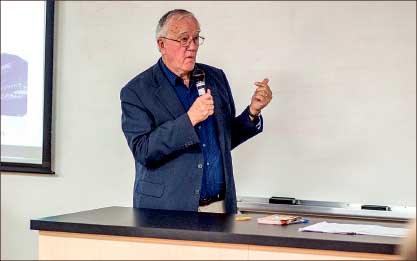Founder of IBEC Ventures makes connections between business and missions
“How do we bring the gospel to the unreached of this world while at the same time addressing the great issues of today?”

Platform — Sharp spoke to students about using the field of business to serve and glorify God. Photo credit: RJ Goodwin
Larry Sharp, founder of IBEC Ventures, a consulting firm that assists businesses around the world use their organization to spread the gospel, answered his question and said, “Business.”
Sharp shared with students at the Entrepreneurship on the Edge forum hosted by the Liberty University Center for Entrepreneurship and Liberty’s global business development program how they could use “business as missions.”
Close to 50 students and faculty attended the event Thursday, Nov. 12 where Sharp and other professionals took turns speaking about their successes and failures in the marketplace and answering questions from students.
Sharp said many areas of the world that have not been reached with the gospel are also places with “massive poverty, massive injustice and massive unemployment.” He said the answer to these problems begins with job creation, and if Christian business owners can leverage their ability to create wealth in these areas, they can also reach the hearts of the people they serve.
Sharp showed videos that profiled some of the companies he consulted for, and he shared some of their success stories. In one instance, a business owner simply had a Bible on the shelf in his office, and a potential recruit asked him if the reason he conducted his business so ethically had to do with that Bible. It led to an opportunity for the owner to share the gospel, and the man came to faith.
“That little vignette shows real business with real people who care about Jesus and making him known to the world, (demonstrating) what this is all about,” Sharp said.
With so many people living in places that do not allow missionary visas, those who want to reach others for Christ must go with the necessary skills to get a job and contribute to the area’s economy. Sharp challenged students to begin using business as missions by searching for internship opportunities overseas, investing in companies that create jobs, and using how God wired them as businesspeople to serve others.
Jonathan Whitt, the president and CEO of the Roanoke-Blacksburg Technology Council, gave students advice on how to attract the funding necessary to start their businesses. He said Christians “are hungry to build the kingdom of God,” and students should present their ideas that align with that mission.
“As you go out and be successful, you’re going to attract other businesspeople to what you’re doing, and I believe the funding is going to come,” Whitt said. “So what we need is more good ideas, more of you taking the risk.”
Paul Halsey, a Liberty alumnus, shared his experiences of working in the Philippines for 14 years and how even though he and his team had access as missionaries, they still had to find creative ways to form relationships with those in the community. He now serves as a mentor to Liberty students who are interested in using their vocation to serve God in foreign countries and leads them in the right direction.
“As I talk to students I realize that they need to ask certain questions that they’re not asking themselves,” Halsey said. “The most important question might not be ‘where?’ or ‘what?’ but ‘who?’ Who is it that you’re going to interact with?”
Senior Paul Nelson said the night’s forum, and specifically Whitt’s message about being willing to take risks, resonated with him as he works with the school of engineering to develop products. He said what he learned at the forum will be beneficial as he works toward a potential career in manufacturing either in the U.S. or abroad.
“I’ve always wanted to put business (and) missions together,” Nelson said.
The next Entrepreneurship on the Edge event will take place Feb. 25, 2016.
Clarke is a copy editor.